Unit 5 Let’s celebrate复习课件共43张PPT
文档属性
| 名称 | Unit 5 Let’s celebrate复习课件共43张PPT | 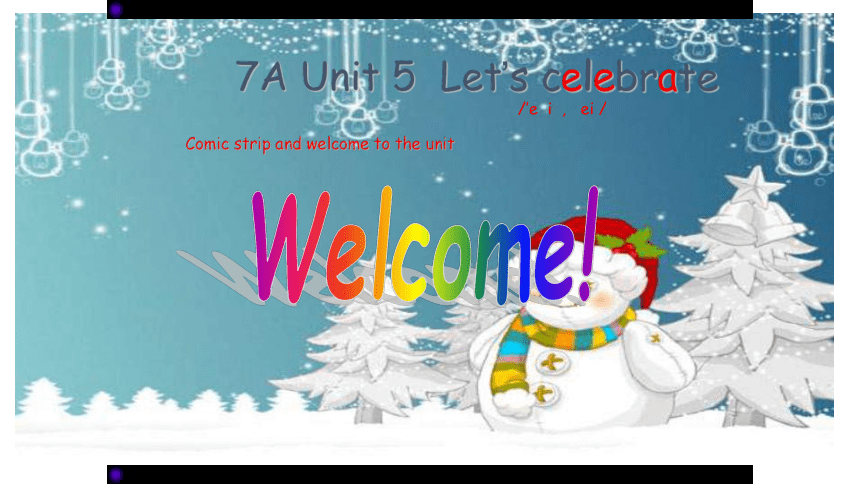 | |
| 格式 | pptx | ||
| 文件大小 | 369.8KB | ||
| 资源类型 | 教案 | ||
| 版本资源 | 牛津译林版 | ||
| 科目 | 英语 | ||
| 更新时间 | 2019-12-26 18:44:14 | ||
图片预览

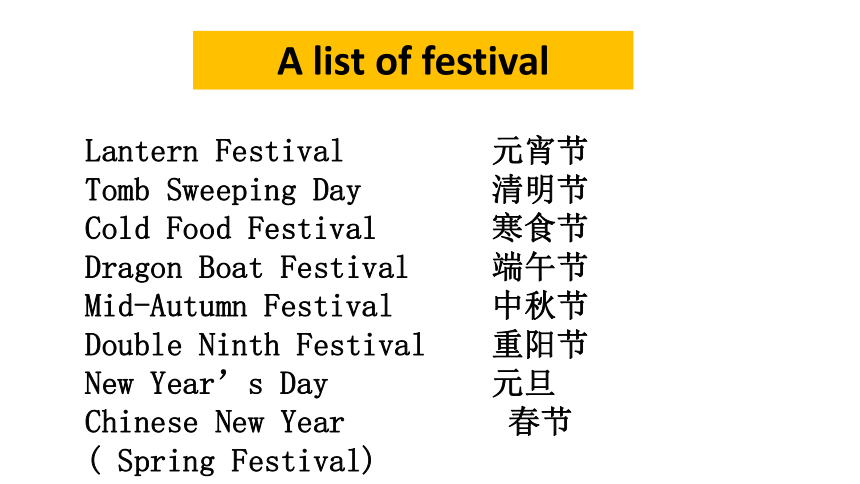
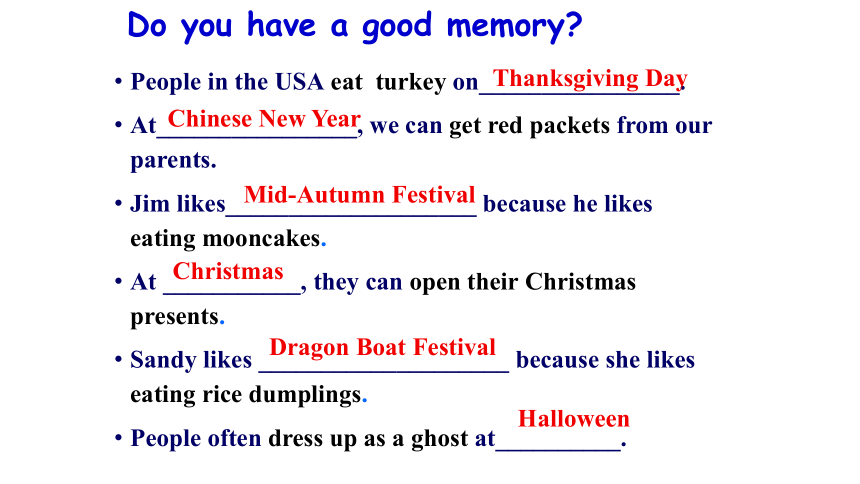
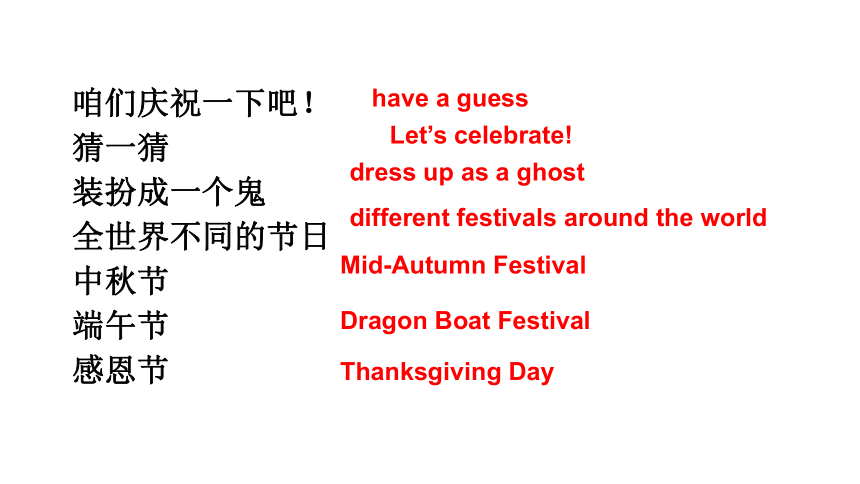
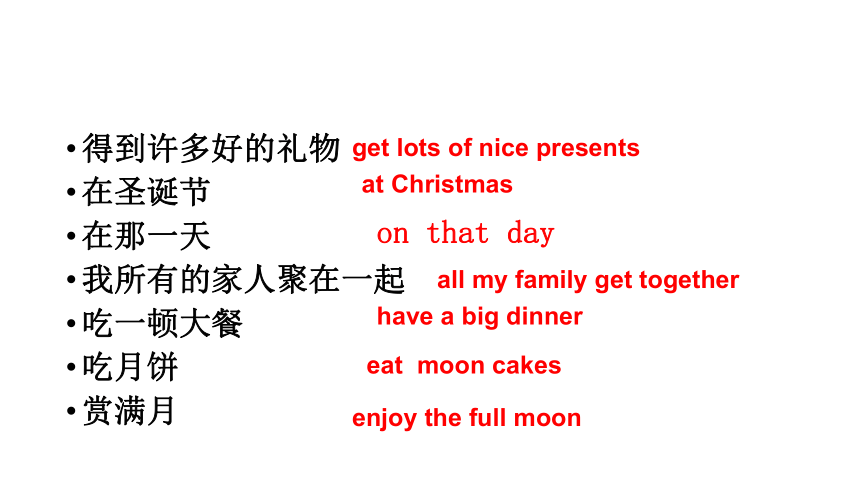

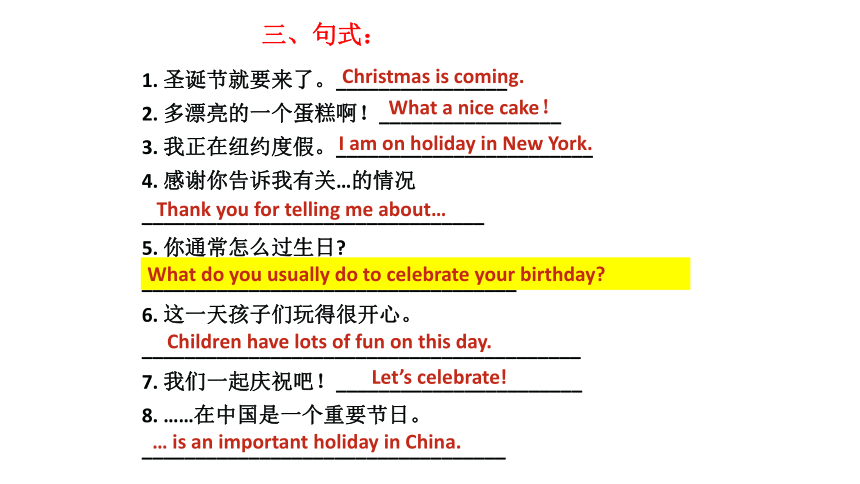
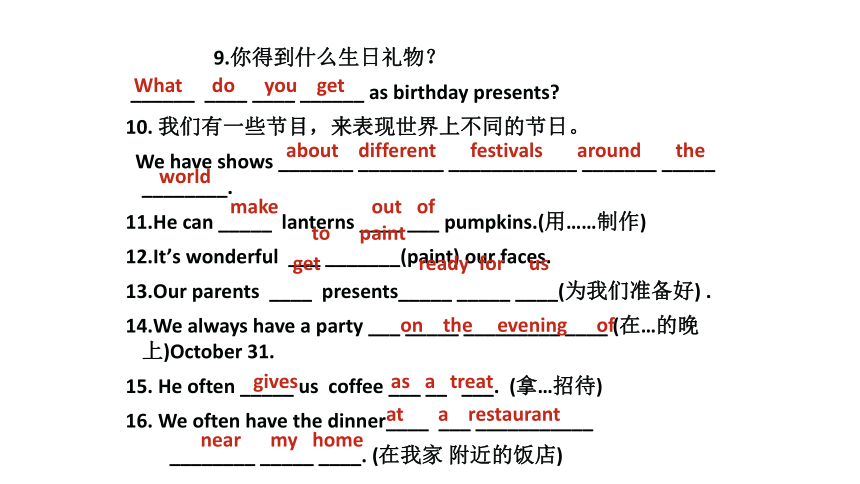

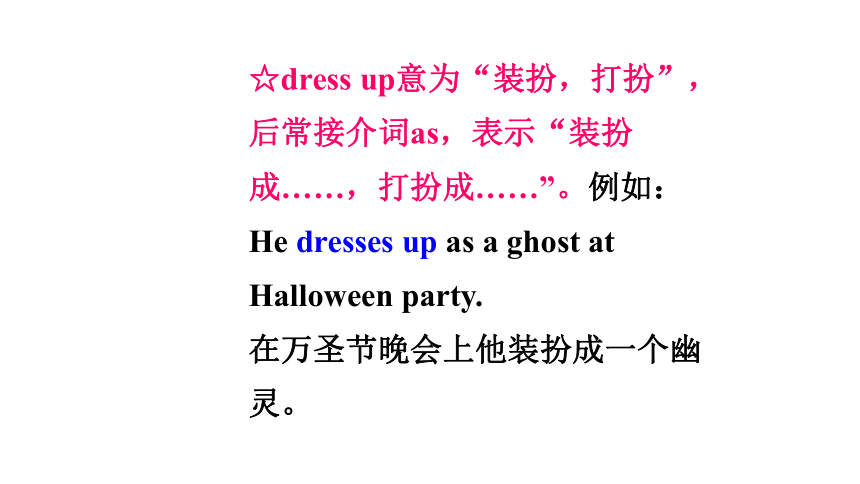
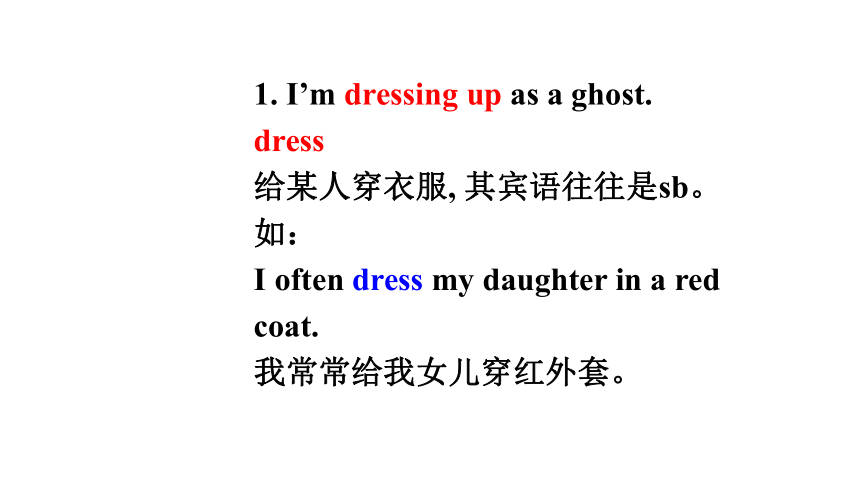
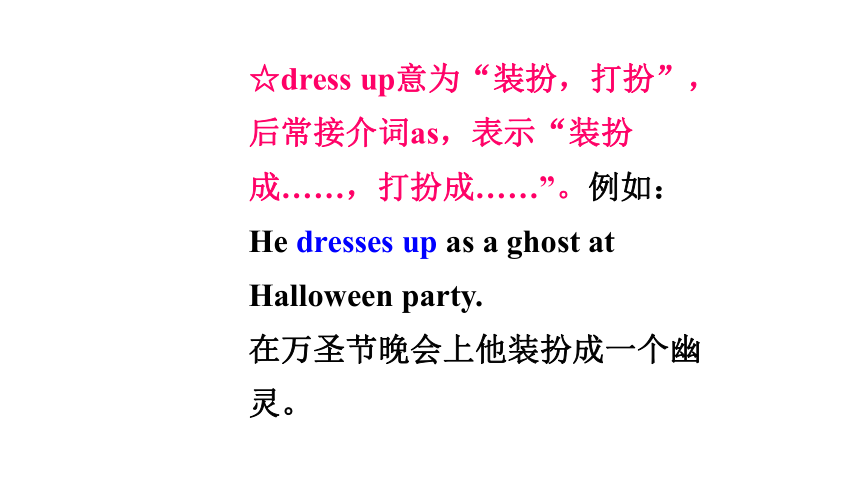
文档简介
(共42张PPT)
Welcome!
7A Unit 5 Let’s celebrate
Comic strip and welcome to the unit
/’e i , ei /
A list of festival
Lantern Festival 元宵节
Tomb Sweeping Day 清明节
Cold Food Festival 寒食节
Dragon Boat Festival 端午节
Mid-Autumn Festival 中秋节
Double Ninth Festival 重阳节
New Year’s Day 元旦
Chinese New Year 春节
( Spring Festival)
People in the USA eat turkey on________________.
At________________, we can get red packets from our parents.
Jim likes____________________ because he likes eating mooncakes.
At ___________, they can open their Christmas presents.
Sandy likes ____________________ because she likes eating rice dumplings.
People often dress up as a ghost at__________.
Thanksgiving Day
Chinese New Year
Mid-Autumn Festival
Christmas
Dragon Boat Festival
Halloween
Do you have a good memory
咱们庆祝一下吧!
猜一猜
装扮成一个鬼
全世界不同的节日
中秋节
端午节
感恩节
Let’s celebrate!
have a guess
dress up as a ghost
different festivals around the world
Mid-Autumn Festival
Dragon Boat Festival
Thanksgiving Day
得到许多好的礼物
在圣诞节
在那一天
我所有的家人聚在一起
吃一顿大餐
吃月饼
赏满月
get lots of nice presents
at Christmas
all my family get together
have a big dinner
eat moon cakes
enjoy the full moon
on that day
1. 赏月_________________
2. 戴面具___________
3. 当夜幕降临时_____________________
4. 与某人玩游戏___________________
5. 那个穿红外套的女孩_______________________
6. 互相赠送礼物_____________________
7.在学校礼堂________________
8. 大部分中国家庭____________________
9. 每年这个时候__________________
10. 收到礼物_______________
11.吃一顿大餐 _____________________
enjoy the full moon
wear masks
when evening comes
play a game with sb.
the girl in a red coat
give each other presents
at the school hall
most Chinese families
at this time of year
get presents
have a big meal/ dinner
1. 圣诞节就要来了。________________
2. 多漂亮的一个蛋糕啊!_________________
3. 我正在纽约度假。________________________
4. 感谢你告诉我有关…的情况________________________________
5. 你通常怎么过生日
___________________________________
6. 这一天孩子们玩得很开心。 _________________________________________
7. 我们一起庆祝吧!_______________________
8. ……在中国是一个重要节日。 __________________________________
Christmas is coming.
What a nice cake!
I am on holiday in New York.
Thank you for telling me about…
How do you usually celebrate your birthday
Children have lots of fun on this day.
… is an important holiday in China.
Let’s celebrate!
What do you usually do to celebrate your birthday
三、句式:
9.你得到什么生日礼物?
______ ____ ____ ______ as birthday presents
10. 我们有一些节目,来表现世界上不同的节日。
We have shows _______ ________ ____________ _______ _____ ________.
11.He can _____ lanterns ____ ___ pumpkins.(用……制作)
12.It’s wonderful ___ _______(paint) our faces.
13.Our parents ____ presents_____ _____ ____(为我们准备好) .
14.We always have a party ___ _____ _________ ____ (在…的晚上)October 31.
15. He often _____ us coffee ___ __ ___. (拿…招待)
16. We often have the dinner____ ___ ___________
________ _____ ____. (在我家 附近的饭店)
What do you get
about different festivals around the world
make out of
to paint
get ready for us
on the evening of
gives as a treat
at a restaurant
near my home
Language points
☆dress up意为“装扮,打扮”,后常接介词as,表示“装扮成……,打扮成……”。例如:
He dresses up as a ghost at Halloween party.
在万圣节晚会上他装扮成一个幽灵。
1. I’m dressing up as a ghost.
dress
给某人穿衣服, 其宾语往往是sb。
如:
I often dress my daughter in a red coat.
我常常给我女儿穿红外套。
☆dress up意为“装扮,打扮”,后常接介词as,表示“装扮成……,打扮成……”。例如:
He dresses up as a ghost at Halloween party.
在万圣节晚会上他装扮成一个幽灵。
put on sth. 穿上衣服,强调“穿的动作” 。
如:It’s cold outside. Please put on your coat.
wear sth. 穿着衣服,表“穿着的状态”。
如:She is wearing a red T-shirt today.
1.-Do you like the new coat, Jack
-Well, let me _____ and see.
A. wear it on B. put on it
C. try it on D. dress on it
中考链接
2. Oh, Danny. It’s raining outside. You’d better( 最好) ________ your raincoat.
A. put on B. put up
C. dress D. wear
根据汉语意思或首字母提示完成句子
1 Hobo, how do we c_________ Halloween
2 What do you usually do at _________(圣诞节) every year 3 Why does she like the D_________ Boat Festival
4 People like eating m_________ at Mid –Autumn Festival.
5.I like Christmas very much.Which is your f_____ festival
6.Why do you like Christmas B_______ I like Christmas trees.
7.Children often d_____ up as Monkey King at Halloween.
8.This comic book is very _________ (有趣的).
elebrate
Christmas
ragon
ooncakes
avourite
ecause
ress
interesting
Exercises
Language points
thank you for sth/ doing sth…
tell me about sth…
the Mid-Autumn Festival
in the USA=in America
on October 31
on that day
have lots of fun
dress up
wear masks
paint our faces
make pumpkin lanterns
因…而感谢某人
告诉我关于…
中秋节
在美国
在10月31日
玩的高兴
在那天
装扮
戴面具
用颜料涂我们的脸
做南瓜灯笼
visit houses
play a game with…
the people inside
knock on their doors
shout “trick or treat”
give us some candy
as a treat
play a trick on them
have a party
on the evening of October 31st
enjoy nice food and drinks
a special day
拜访左邻右舍 / 屋主
和…玩游戏
里面的人
敲他们的门
大声叫不招待就使坏
给我们一些糖果
作为招待
开一个派对/晚会
捉弄他们
在10月31号晚上
享受美食和饮料
特殊的一天
1. Thank you for... = Thanks for
Thank you/ Thanks for your help.
Thank you/ Thanks for helping me.
--Thank you for telling me about the
Mid-Autumn Festival .
--You are welcome./ It’s my pleasure.
Not at all.
谢谢你帮助我
谢谢你告诉我关于中秋节
2. tell sb about sth
告诉我们你的学校
告诉他你的生活
tell us about your school
tell him about your life
have (a lot of ) fun
have a good time
3. have lots of fun
doing
我们在公园里放风筝玩的很开心
We _____ a good _____ ________kites in the park.
We have ____ ____ fun _______ kites in the park.
have time flying
崔雨康做南瓜灯玩的很开心。
Cui Yukang ____ a lot ___ _____ ________pumpkin
lanterns.
lots of flying
has of fun making
4. on October 31 在 十月三十一日
on Sunday
on a cold morning
on the evening of November 1
in the morning
at 6:00 p.m.
在周日
on November 1, 2012
在2012年9月1号
在一个寒冷的早上
在9月 1号晚上
在早上
在10月
在6点
在早饭时间
at breakfast
in October
5. dress up
我们在万圣节前夕装扮。
We dress up at Halloween.
西蒙在万圣节前夕装扮成了鬼
Simon dresses up as a ghost at Halloween.
6. knock on their doors
敲他们的门
knock on… = knock at…
敲黑板
knock on / at the blackboard
7. give us some candy as a treat
给我们一些糖果作为招待
give sb sth = give sth to sb
give me the book / give the book to me
给我这本书
give sb sth as a treat=give sb a treat of sth
给某人某物作为招待
8. play a trick on… 捉弄某人,跟某人开玩笑
He likes _____________________(跟别人开玩笑).
playing tricks on others
8.在度假
(be) on holiday= (be) on one's holidays
on 表示在进行中: on business, on a trip
—Where is Jack, do you know
—He _____ in Guilin.
likes a holiday
B. is on holiday
C. have a holiday
B
9.seem 好像;似乎
(1) sb. +seem(s)+(to be) +n/adj. 表示主语的特征或状态
她像一个傻瓜。
She seems (to be) a fool.
Mike似乎很难过.
Mike seems (to be) very happy.
(2) sb. +seem(s)+to do.
她好像得了重感冒。
She seems to have a bad cold.
(3) It+seems+(that)从句
她好像得了重感冒。
It seems that she has a bad cold.
10.different 不同的
be different from...与……不同
乡村生活不同于城市生活。
Life in the country is different from the life in the city.
difference C.n.
这对双胞胎之间有许多不同。
There are ______ _________ between the twins.
many differences
11.important重要的
be important for sb ... 对某人很重要
It is important (for sb) to do (对某人来说做……很重要)
English is important for us. So it is important (for us )
to learn it well.
( )1. ___ the evening of 31 October, we usually have a big party.
A. In B. On C. At D./
( ) 2.Thank you for ___ me the good news.
A. giveing B. giving C. give D .gives
( ) 3.Can you ___ me ___ your family
A. tell; about B. tell; in
C. say; about D. talk; about
B
B
A
Asking ‘Wh-’questions.
特殊疑问句构成: 特殊疑问词+一般疑问句。
特殊疑问词大部分由wh开头,比如:
1. What----
(对行为和事物提问)
e.g. 1. —What are you going to do
—I am going to play football.
2. —What is your name
—My name is Millie.
Activity or thing
2. Which----
(对特定的人或事物提问)
Thing or person
e.g. —Which English book is yours
—The one on the table is mine.
—Which man is your father
—The one in white shirt.
3. Who----
(对人提问)
Person
4. Whose----
(对人的所有关系提问)
Possession
e.g.—Who will visit you tomorrow
—My best friend.
e.g.—Whose bike is this
—It is mine.
5. When----
(对时间提问)
Time
e.g.—When do you go to school
—At 7:00.
—When do people celebrate Christmas
—People celebrate it on December 25.
What time
6. Where----
(对地点提问)
Place
e.g.—Where do you come from?
—I am from Biancheng.
7. Why----
(对原因提问)
Reason
e.g.—Why do you like Chinese New Year
—Because I can get red packets from my parents.
8. how----
(对方式提问)
Manner
e.g.—How do you go to school
—On foot.
1.I go to school by bus.
2.She is beautiful.
3.Tom is polite and helpful.
How do you go to school
How is she
How is Tom
how对方式,外貌还有性格品质进行提问。
对划线部分提问。
1. We are going to Guilin.
2. Chinese New Year this year is in
February.
3. Kitty is wearing a special costume.
4. I want a model train for Christmas.
______ are you going
______ is Chinese New Year this year
______ is wearing a special costume
______ do you want for Christmas
Where
When
Who
What
5. This is Millie’s bag..
6. We celebrate Christmas by giving presents.
7. The red scarf is for me.
8. The woman in a brown blouse is my aunt.
9. We watch TV for two hours on Sunday.
______ bag is this
_____ do you celebrate Christmas
______ scarf is for
______________ is your aunt
______ do you watch TV on Sunday
Whose
How
Which
Which woman
How long
感叹句
what修饰名词
how 修饰形容词,副词或动词
What+a/an+形容词+可数名词单数+ 陈述语
What a clever boy (he is)!
What+ 形容词+复数名词+ 陈述语序
What wonderful ideas (we have)!
What+ 形容词+不可数名词+ 陈述语序
What cold weather (it is)!
how 修饰形容词,副词或动词
How +形容词+ a/an/the +名词单数+ 陈述语序
How clever a boy (he is)!
How cold the weather (it is)!
How happy the girls (they are)!
How+形容词/副词+ 陈述语序
How nice they are!
How fast he runs!
How+主语+动词
How time flies!
四、巩固练习
( ) 1. Can you help me_______ who broke(打破) the window
A. look for B. find C. find out D. watch
( ) 2. Excuse me,________ do you say that in English
A. how B. who C. where D. what
( ) 3.—________ coat do you like best, Nancy
—The yellow one.
A. Who B. Which C. Whose D. What
( ) 4.—________ will you stay there
—For about a month.
A. How often B. How long
C. How many D. How much
C
A
B
B
( )5. —Which is your teacher
—The one__________ glasses over her eyes is.
A. wears B. wear C. with D. has
( )6.It is _______ interesting work , I like ____ book very much.
A. a, the B. an, the C. the, a D. / the
( )7. —_______
—He is strong and helpful.
A. How is he like B. What is he like
C. What does he like D. How does he look like
( )8. —I'm going to Hainan Island(岛) for a holiday.
—___________.
A. Good-bye B. You're right
C. It's good D. Have a good time
C
B
B
D
Thank You !
Welcome!
7A Unit 5 Let’s celebrate
Comic strip and welcome to the unit
/’e i , ei /
A list of festival
Lantern Festival 元宵节
Tomb Sweeping Day 清明节
Cold Food Festival 寒食节
Dragon Boat Festival 端午节
Mid-Autumn Festival 中秋节
Double Ninth Festival 重阳节
New Year’s Day 元旦
Chinese New Year 春节
( Spring Festival)
People in the USA eat turkey on________________.
At________________, we can get red packets from our parents.
Jim likes____________________ because he likes eating mooncakes.
At ___________, they can open their Christmas presents.
Sandy likes ____________________ because she likes eating rice dumplings.
People often dress up as a ghost at__________.
Thanksgiving Day
Chinese New Year
Mid-Autumn Festival
Christmas
Dragon Boat Festival
Halloween
Do you have a good memory
咱们庆祝一下吧!
猜一猜
装扮成一个鬼
全世界不同的节日
中秋节
端午节
感恩节
Let’s celebrate!
have a guess
dress up as a ghost
different festivals around the world
Mid-Autumn Festival
Dragon Boat Festival
Thanksgiving Day
得到许多好的礼物
在圣诞节
在那一天
我所有的家人聚在一起
吃一顿大餐
吃月饼
赏满月
get lots of nice presents
at Christmas
all my family get together
have a big dinner
eat moon cakes
enjoy the full moon
on that day
1. 赏月_________________
2. 戴面具___________
3. 当夜幕降临时_____________________
4. 与某人玩游戏___________________
5. 那个穿红外套的女孩_______________________
6. 互相赠送礼物_____________________
7.在学校礼堂________________
8. 大部分中国家庭____________________
9. 每年这个时候__________________
10. 收到礼物_______________
11.吃一顿大餐 _____________________
enjoy the full moon
wear masks
when evening comes
play a game with sb.
the girl in a red coat
give each other presents
at the school hall
most Chinese families
at this time of year
get presents
have a big meal/ dinner
1. 圣诞节就要来了。________________
2. 多漂亮的一个蛋糕啊!_________________
3. 我正在纽约度假。________________________
4. 感谢你告诉我有关…的情况________________________________
5. 你通常怎么过生日
___________________________________
6. 这一天孩子们玩得很开心。 _________________________________________
7. 我们一起庆祝吧!_______________________
8. ……在中国是一个重要节日。 __________________________________
Christmas is coming.
What a nice cake!
I am on holiday in New York.
Thank you for telling me about…
How do you usually celebrate your birthday
Children have lots of fun on this day.
… is an important holiday in China.
Let’s celebrate!
What do you usually do to celebrate your birthday
三、句式:
9.你得到什么生日礼物?
______ ____ ____ ______ as birthday presents
10. 我们有一些节目,来表现世界上不同的节日。
We have shows _______ ________ ____________ _______ _____ ________.
11.He can _____ lanterns ____ ___ pumpkins.(用……制作)
12.It’s wonderful ___ _______(paint) our faces.
13.Our parents ____ presents_____ _____ ____(为我们准备好) .
14.We always have a party ___ _____ _________ ____ (在…的晚上)October 31.
15. He often _____ us coffee ___ __ ___. (拿…招待)
16. We often have the dinner____ ___ ___________
________ _____ ____. (在我家 附近的饭店)
What do you get
about different festivals around the world
make out of
to paint
get ready for us
on the evening of
gives as a treat
at a restaurant
near my home
Language points
☆dress up意为“装扮,打扮”,后常接介词as,表示“装扮成……,打扮成……”。例如:
He dresses up as a ghost at Halloween party.
在万圣节晚会上他装扮成一个幽灵。
1. I’m dressing up as a ghost.
dress
给某人穿衣服, 其宾语往往是sb。
如:
I often dress my daughter in a red coat.
我常常给我女儿穿红外套。
☆dress up意为“装扮,打扮”,后常接介词as,表示“装扮成……,打扮成……”。例如:
He dresses up as a ghost at Halloween party.
在万圣节晚会上他装扮成一个幽灵。
put on sth. 穿上衣服,强调“穿的动作” 。
如:It’s cold outside. Please put on your coat.
wear sth. 穿着衣服,表“穿着的状态”。
如:She is wearing a red T-shirt today.
1.-Do you like the new coat, Jack
-Well, let me _____ and see.
A. wear it on B. put on it
C. try it on D. dress on it
中考链接
2. Oh, Danny. It’s raining outside. You’d better( 最好) ________ your raincoat.
A. put on B. put up
C. dress D. wear
根据汉语意思或首字母提示完成句子
1 Hobo, how do we c_________ Halloween
2 What do you usually do at _________(圣诞节) every year 3 Why does she like the D_________ Boat Festival
4 People like eating m_________ at Mid –Autumn Festival.
5.I like Christmas very much.Which is your f_____ festival
6.Why do you like Christmas B_______ I like Christmas trees.
7.Children often d_____ up as Monkey King at Halloween.
8.This comic book is very _________ (有趣的).
elebrate
Christmas
ragon
ooncakes
avourite
ecause
ress
interesting
Exercises
Language points
thank you for sth/ doing sth…
tell me about sth…
the Mid-Autumn Festival
in the USA=in America
on October 31
on that day
have lots of fun
dress up
wear masks
paint our faces
make pumpkin lanterns
因…而感谢某人
告诉我关于…
中秋节
在美国
在10月31日
玩的高兴
在那天
装扮
戴面具
用颜料涂我们的脸
做南瓜灯笼
visit houses
play a game with…
the people inside
knock on their doors
shout “trick or treat”
give us some candy
as a treat
play a trick on them
have a party
on the evening of October 31st
enjoy nice food and drinks
a special day
拜访左邻右舍 / 屋主
和…玩游戏
里面的人
敲他们的门
大声叫不招待就使坏
给我们一些糖果
作为招待
开一个派对/晚会
捉弄他们
在10月31号晚上
享受美食和饮料
特殊的一天
1. Thank you for... = Thanks for
Thank you/ Thanks for your help.
Thank you/ Thanks for helping me.
--Thank you for telling me about the
Mid-Autumn Festival .
--You are welcome./ It’s my pleasure.
Not at all.
谢谢你帮助我
谢谢你告诉我关于中秋节
2. tell sb about sth
告诉我们你的学校
告诉他你的生活
tell us about your school
tell him about your life
have (a lot of ) fun
have a good time
3. have lots of fun
doing
我们在公园里放风筝玩的很开心
We _____ a good _____ ________kites in the park.
We have ____ ____ fun _______ kites in the park.
have time flying
崔雨康做南瓜灯玩的很开心。
Cui Yukang ____ a lot ___ _____ ________pumpkin
lanterns.
lots of flying
has of fun making
4. on October 31 在 十月三十一日
on Sunday
on a cold morning
on the evening of November 1
in the morning
at 6:00 p.m.
在周日
on November 1, 2012
在2012年9月1号
在一个寒冷的早上
在9月 1号晚上
在早上
在10月
在6点
在早饭时间
at breakfast
in October
5. dress up
我们在万圣节前夕装扮。
We dress up at Halloween.
西蒙在万圣节前夕装扮成了鬼
Simon dresses up as a ghost at Halloween.
6. knock on their doors
敲他们的门
knock on… = knock at…
敲黑板
knock on / at the blackboard
7. give us some candy as a treat
给我们一些糖果作为招待
give sb sth = give sth to sb
give me the book / give the book to me
给我这本书
give sb sth as a treat=give sb a treat of sth
给某人某物作为招待
8. play a trick on… 捉弄某人,跟某人开玩笑
He likes _____________________(跟别人开玩笑).
playing tricks on others
8.在度假
(be) on holiday= (be) on one's holidays
on 表示在进行中: on business, on a trip
—Where is Jack, do you know
—He _____ in Guilin.
likes a holiday
B. is on holiday
C. have a holiday
B
9.seem 好像;似乎
(1) sb. +seem(s)+(to be) +n/adj. 表示主语的特征或状态
她像一个傻瓜。
She seems (to be) a fool.
Mike似乎很难过.
Mike seems (to be) very happy.
(2) sb. +seem(s)+to do.
她好像得了重感冒。
She seems to have a bad cold.
(3) It+seems+(that)从句
她好像得了重感冒。
It seems that she has a bad cold.
10.different 不同的
be different from...与……不同
乡村生活不同于城市生活。
Life in the country is different from the life in the city.
difference C.n.
这对双胞胎之间有许多不同。
There are ______ _________ between the twins.
many differences
11.important重要的
be important for sb ... 对某人很重要
It is important (for sb) to do (对某人来说做……很重要)
English is important for us. So it is important (for us )
to learn it well.
( )1. ___ the evening of 31 October, we usually have a big party.
A. In B. On C. At D./
( ) 2.Thank you for ___ me the good news.
A. giveing B. giving C. give D .gives
( ) 3.Can you ___ me ___ your family
A. tell; about B. tell; in
C. say; about D. talk; about
B
B
A
Asking ‘Wh-’questions.
特殊疑问句构成: 特殊疑问词+一般疑问句。
特殊疑问词大部分由wh开头,比如:
1. What----
(对行为和事物提问)
e.g. 1. —What are you going to do
—I am going to play football.
2. —What is your name
—My name is Millie.
Activity or thing
2. Which----
(对特定的人或事物提问)
Thing or person
e.g. —Which English book is yours
—The one on the table is mine.
—Which man is your father
—The one in white shirt.
3. Who----
(对人提问)
Person
4. Whose----
(对人的所有关系提问)
Possession
e.g.—Who will visit you tomorrow
—My best friend.
e.g.—Whose bike is this
—It is mine.
5. When----
(对时间提问)
Time
e.g.—When do you go to school
—At 7:00.
—When do people celebrate Christmas
—People celebrate it on December 25.
What time
6. Where----
(对地点提问)
Place
e.g.—Where do you come from?
—I am from Biancheng.
7. Why----
(对原因提问)
Reason
e.g.—Why do you like Chinese New Year
—Because I can get red packets from my parents.
8. how----
(对方式提问)
Manner
e.g.—How do you go to school
—On foot.
1.I go to school by bus.
2.She is beautiful.
3.Tom is polite and helpful.
How do you go to school
How is she
How is Tom
how对方式,外貌还有性格品质进行提问。
对划线部分提问。
1. We are going to Guilin.
2. Chinese New Year this year is in
February.
3. Kitty is wearing a special costume.
4. I want a model train for Christmas.
______ are you going
______ is Chinese New Year this year
______ is wearing a special costume
______ do you want for Christmas
Where
When
Who
What
5. This is Millie’s bag..
6. We celebrate Christmas by giving presents.
7. The red scarf is for me.
8. The woman in a brown blouse is my aunt.
9. We watch TV for two hours on Sunday.
______ bag is this
_____ do you celebrate Christmas
______ scarf is for
______________ is your aunt
______ do you watch TV on Sunday
Whose
How
Which
Which woman
How long
感叹句
what修饰名词
how 修饰形容词,副词或动词
What+a/an+形容词+可数名词单数+ 陈述语
What a clever boy (he is)!
What+ 形容词+复数名词+ 陈述语序
What wonderful ideas (we have)!
What+ 形容词+不可数名词+ 陈述语序
What cold weather (it is)!
how 修饰形容词,副词或动词
How +形容词+ a/an/the +名词单数+ 陈述语序
How clever a boy (he is)!
How cold the weather (it is)!
How happy the girls (they are)!
How+形容词/副词+ 陈述语序
How nice they are!
How fast he runs!
How+主语+动词
How time flies!
四、巩固练习
( ) 1. Can you help me_______ who broke(打破) the window
A. look for B. find C. find out D. watch
( ) 2. Excuse me,________ do you say that in English
A. how B. who C. where D. what
( ) 3.—________ coat do you like best, Nancy
—The yellow one.
A. Who B. Which C. Whose D. What
( ) 4.—________ will you stay there
—For about a month.
A. How often B. How long
C. How many D. How much
C
A
B
B
( )5. —Which is your teacher
—The one__________ glasses over her eyes is.
A. wears B. wear C. with D. has
( )6.It is _______ interesting work , I like ____ book very much.
A. a, the B. an, the C. the, a D. / the
( )7. —_______
—He is strong and helpful.
A. How is he like B. What is he like
C. What does he like D. How does he look like
( )8. —I'm going to Hainan Island(岛) for a holiday.
—___________.
A. Good-bye B. You're right
C. It's good D. Have a good time
C
B
B
D
Thank You !
同课章节目录
- 预备课程
- Lesson 1 Nice to meet you !
- Lesson 2 A happy family
- Lesson 3 A nice school
- Lesson 4 You look cool !
- Lesson 5 Wonderful things
- Lesson 6 Have nice food
- Lesson 7 Enjoy our days
- Lesson 8 Let's have fun !
- Unit 1 This is me
- Unit 2 Let's play sports
- Unit 3 Welcome to our school
- Unit 4 My day
- Unit 5 Let’s celebrate
- Unit 6 Food and lifestyle
- Unit 7 Shopping
- Unit 8 Fashion
